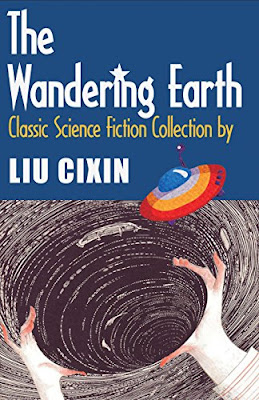Bookshot #121: The Wandering Earth
 I've never been big into collections of short stories. But lately, I've been hearing more and more about the rise of Chinese science fiction and when a preview for The Wandering Earth showed up on the interwebs a few months back, I decided to run down the original novella by Liu Cixin and give it a try-- I didn't know, however that it came along with more short stories. So, I worked my way through all of them and this is what I thought:
I've never been big into collections of short stories. But lately, I've been hearing more and more about the rise of Chinese science fiction and when a preview for The Wandering Earth showed up on the interwebs a few months back, I decided to run down the original novella by Liu Cixin and give it a try-- I didn't know, however that it came along with more short stories. So, I worked my way through all of them and this is what I thought:The titular novella, The Wandering Earth tells the story of a future where scientists detect an impending hydrogen burst from the sun which will wipe out all life in the inner solar system. In response, humanity unites to construct massive Earth Engines to first stop Earth's rotation and then start a journey out of the solar system and into the nearby star system at Proxima Centauri. Most of Earth's surface is ruined and then frozen by first stopping the rotation of the planet and then moving out into the darkness of space. Humanity is forced to live underground and adopt a long-term perspective, as the journey of Earth will take generations. As the decades pass, splits begin to emerge in the human consensus as the hydrogen burst fails to occur and a rebellion breaks out, killing many- but as the victors are about the execute their prisoners, it finally happens, vindicating the project and providing warmth to Earth's surface for a moment before the planet continues on into the dark.
The rest of the collection is equally interesting and imaginative. It's obvious that Cixin likes to play with big, epic themes in a way that's kind of refreshing to me. Stories like The Mountain which tells the story of first contact with aliens who suck up all the water to create a giant mountain that the main character chooses to climb. Sun of China tells the story of a man's epic journey from a rural village in China to Beijing to the great artificial sun that they have built to bring light to China. But for all that he directs his gaze out to the stars, he also proves himself brilliant and directing his gaze within. Of Ants and Dinosaurs imagines a different set of civilizations on Earth-- one for ants and one for dinosaurs that have a confrontation that eventually destroys them both-- though just when you think he's left that behind, there's an interesting tieback to the story in Devourer, which is the tale of a huge space ship that travels the galaxy eating planet that has set it's sights on Earth-- it's not until later in the story that humanity discovers that the lizard like race piloting the ship is descended from the dinosaurs of Earth. (There are some nice little connections between The Longest Fall and Her Eyes as well.)
Curse 5.0 kind of stands out for me, as it takes a more cyberpunk tack and looks at the development of a computer virus/worm that starts as a simple 'curse' but eventually goes through four more sinister iterations before it threatens the existence of humanity itself. The concept itself would have been an interesting hook for a story, but Cixin gets a little meta with this one and makes himself and a fellow author characters in the story who collaborate to write a massive science fiction epic that nobody bothers to read and ruins them both financially and leaves them both homeless- they too play a part in the development of the curse as it reaches it final form.
If there are stories that don't really stand out for me, it's probably the trio of The Micro-Age, Taking Care of Gods and The Wages of Humanity. None of the stories in the collection are bad, per say- it's just that these three... were kind of 'meh' and didn't really do anything for me in terms of reading pleasure. I thought The Micro-Age was a cool concept that sort of didn't land. I'd like to think that if humanity had managed to shrink itself down to avoid global catastrophe they would spread out and do amazing things and not be so childlike and innocent. (Also, the casual genocide at the end of the story was like, 'what?') I think The Wages of Humanity was trying to make a point about global capitalism, but I'm not sure what it was and I liked the assassin angle of it far more than the aliens and the super rich thing the story ended up being about. Taking Care of Gods was another one that just didn't land well with me-- felt a little too much like elder abuse, but it ended in kind of a sweet way, so that kind of saved it for me.
Overall: This was an awesome collection of science fiction from an author that I would love to read more of. Will have to try and dig up some of his novels and see what they're like. My Grade: **** out of ****


Comments
Post a Comment